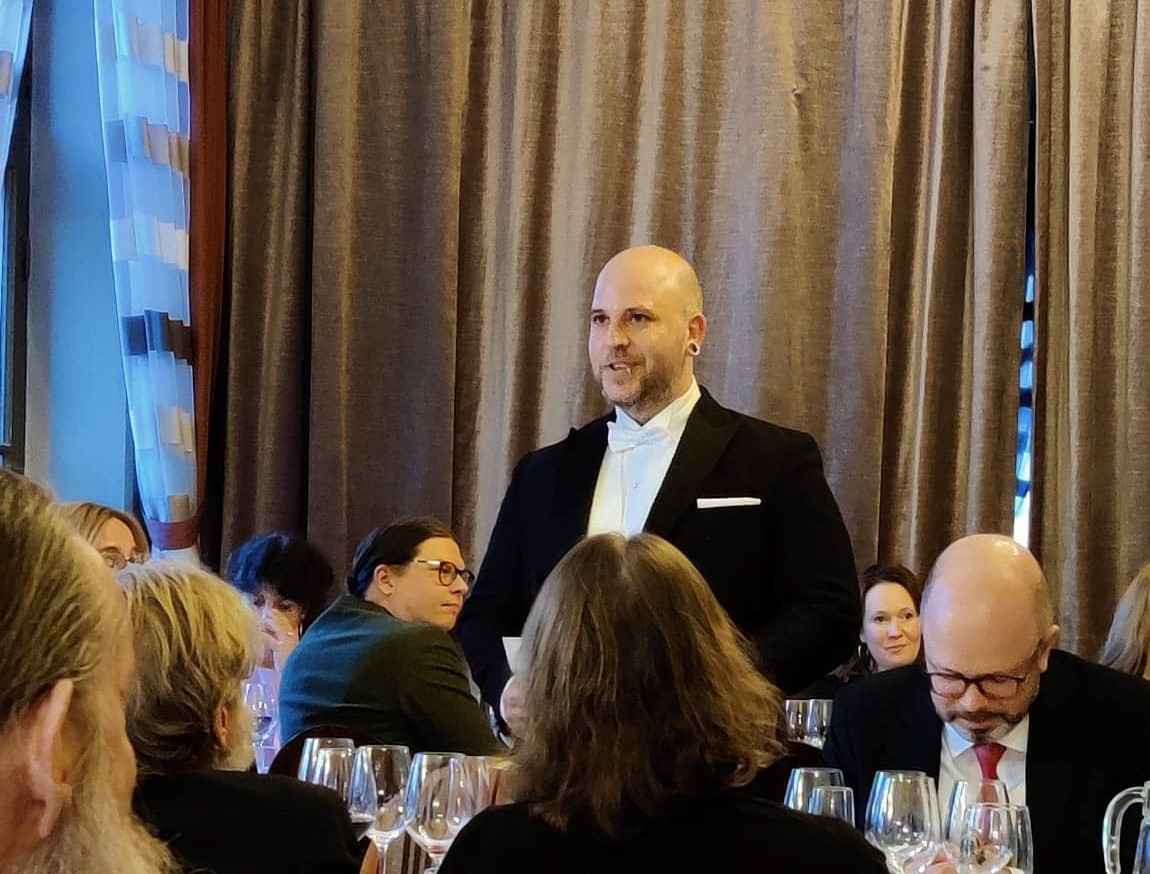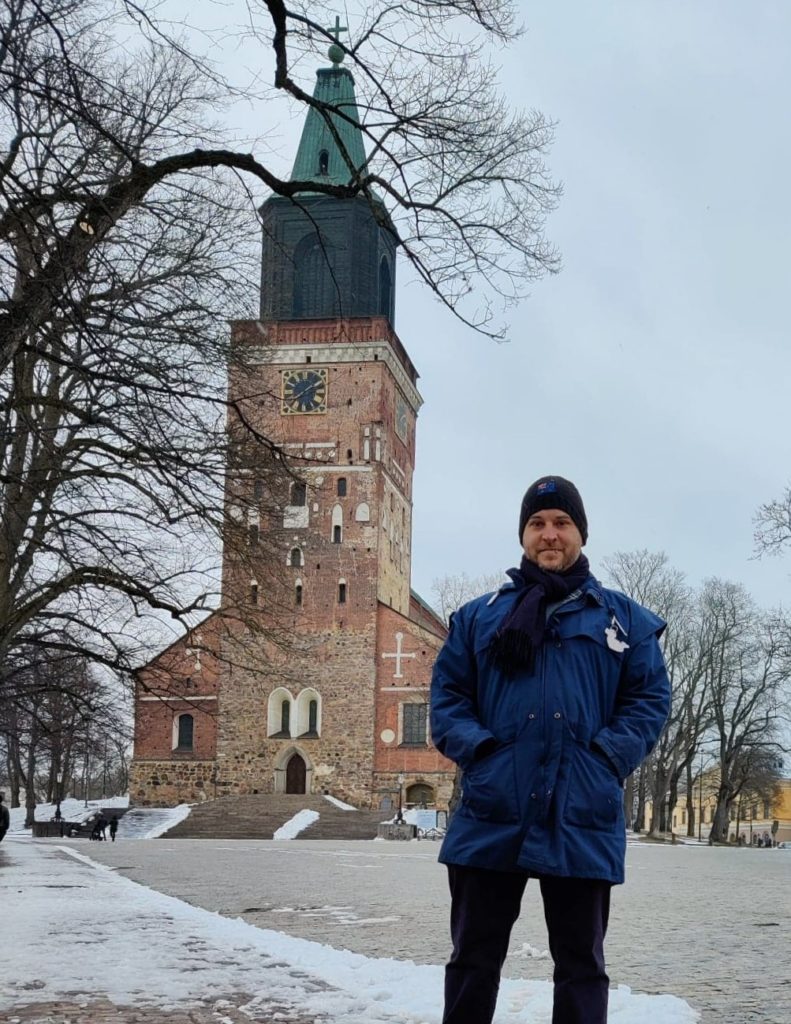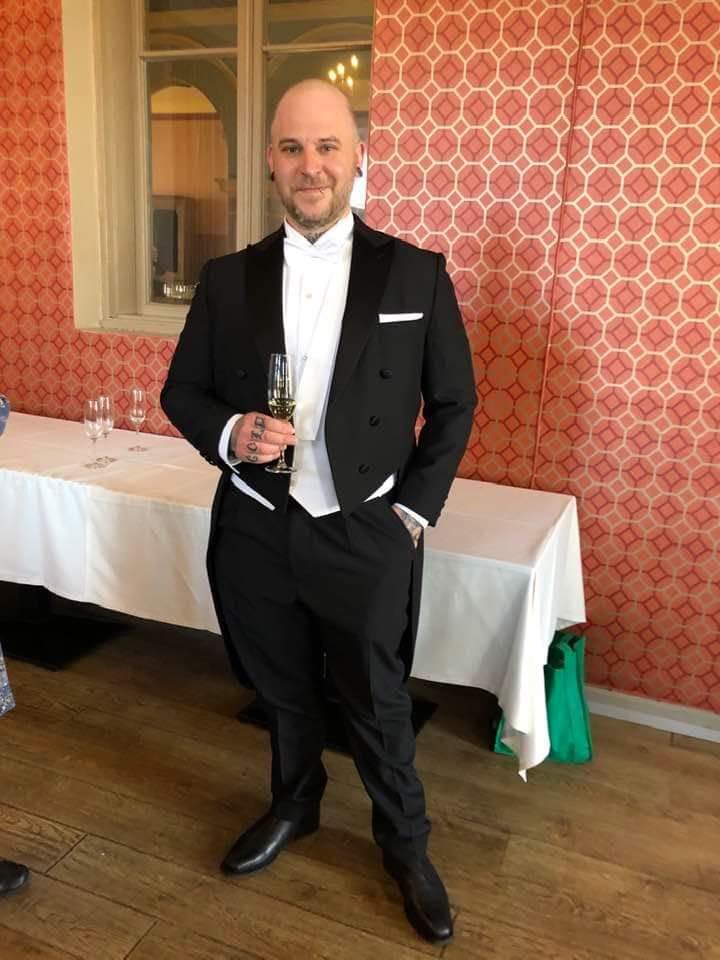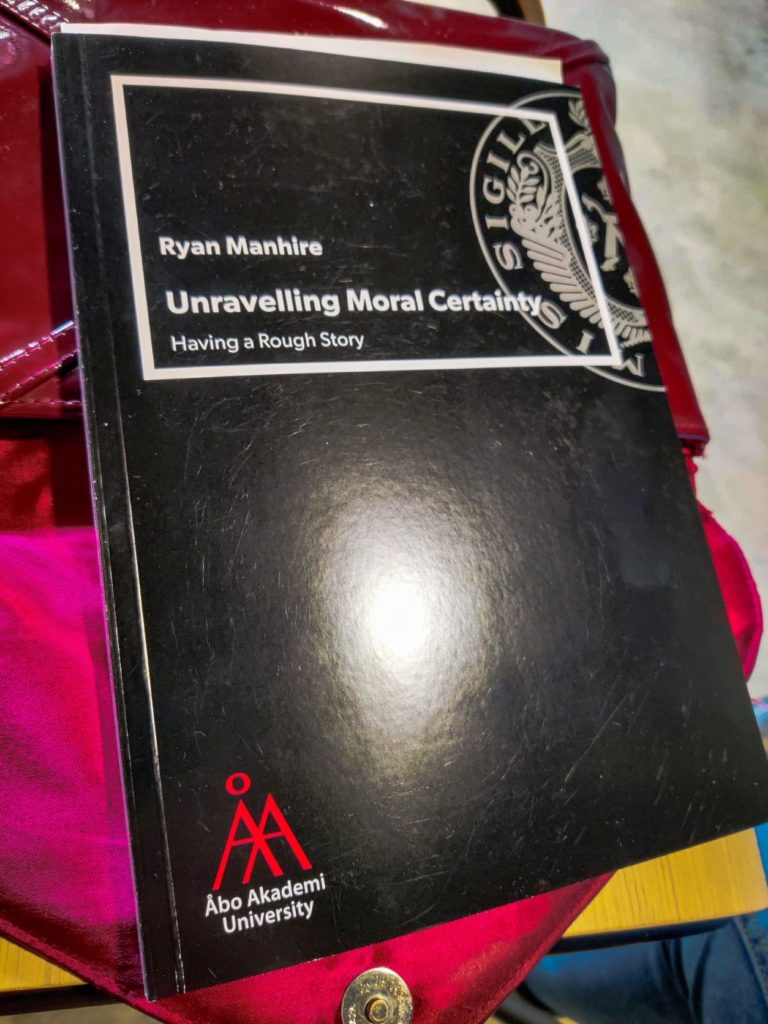
“I didn’t finish high school…and I didn’t have any sort of qualifications before attending Flinders University. Now suddenly, I have a book. There have been many amazing experiences along the way, but I think that’s the one thing that’s made me proudest.”
Some stories are so inspirational, you just need to tell them. Dr Ryan Manhire went from school drop-out to a postdoc at one of Europe’s leading ethical centres. Read on to find out how he forged his path with the help of a Bachelor of Arts and Cotutelle Doctoral degree in Philosophy.
Dr Ryan Manhire never finished high school. After year 11 he started making his money in a range of manual labouring jobs – everything from working on mushroom farms and shampoo production lines to driving forklifts and butchering meat. He also never completed an apprenticeship.
Ryan had always read a lot of fiction and he soon started getting into philosophical novels like Albert Camus’ ‘The Plague’. Following a trip to Japan that gave him more perspective on how big the world out there actually was, at 26 Ryan decided he would quit his job and study Philosophy.
Finding his specialty with the Bachelor of Arts
“I originally started with a Bachelor of Arts in Philosophy and Creative Writing, because I was really influenced by these philosophical novels I was reading and thought maybe I can write them as well”, he tells us. “I had no idea how open the BA was until I looked into it. As often happens when you start a BA, I soon found out what I really liked, and what I wasn’t quite so into. I tried a couple of different things in my first year such as Politics and Women’s and Gender Studies and eventually gravitated towards what I enjoyed most. I held onto Philosophy and dropped Creative Writing. Instead, I took on Indigenous and Australian Studies and History. So in the end, I double-majored in Philosophy and Australian Studies and minored in History.
“There were two lecturers that really impressed me. The first was Dr Catherine Kevin, a historian. The other was Dr Christine Nicholls who was an expert in Australian Studies and Indigenous Australian languages and arts. Christine gave me an amazing overview of what’s going on in the communities, policies around language, the complexity and number of Indigenous Australian languages and cultures. Catherine had the benefit of doing History combined with cultural theory which pushed it into my area. Both scholars were instrumental in my approach to “doing academia” in a way that looked at and worked to influence what really matters in life.
“My idea was to get rigorous critical thinking skills with Philosophy, but then actually have something to apply them to so it’s not as abstract. What I found was that thanks to my philosophical training, I had an easier time writing Indigenous Studies, Australian Studies, and History essays all throughout my undergrad, because I could just really hone in on what exactly we were talking about. This combination just seemed to work. I was getting high distinctions which I, as someone that had never finished high school, was quite happy with.”
When he got to his Honours year, Ryan had to decide between Australian Studies or Philosophy. He chose Philosophy after philosopher Ludwig Wittgenstein was brought to his attention by Dr Andrew Gleeson. “How he wrote and thought was like nothing I’d ever seen before and I just had to look into it. I had to know more.”

Taking it international with a Cotutelle Doctorate Degree
Ryan stuck with Philosophy for his PhD and completed a Cotutelle doctorate – a doctoral degree program partly undertaken overseas – in this case, a combination of Flinders as the host university and Åbo Akademi University in Turku, Finland as the international partner institute. “Similar to how I approached the BA, I knew exactly who I wanted to supervise me overseas, who I wanted to learn from. I then realised that the Cotutelle could be used to do this.”
Supervised by Associate Professor Craig Taylor and Dr Andrew Gleeson in Australia, Ryan was invited to St Kilda to the house of moral philosopher and author of “Romulus, My Father”, Raimond Gaita. “The first visit was to talk about two papers by visiting American scholar Cora Diamond, who’s a very big name in the sort of philosophy that I do. That was very exciting for me. About six months later, I was invited again, this time to talk about two papers by a Finnish philosopher called Lars Hertzberg. I’d never heard of him before. But as soon as I started to read the papers we would be discussing, I just thought this is it – this is the guy.”
Ryan lined everything up to go to Finland in late 2017, where he would be supervised by both Lars and the current Professor of Åbo Akademi University, Martin Gustafsson. Required to take further topics at Åbo Akademi University, Ryan chose Swedish, the language spoken at this university. Due to Finland’s history, there is a minority of about 5% of Finns that speak Swedish as their first language. “I managed to learn enough to get around and can still say things like ‘Hello, my friend, how are you?’, ‘Thank you so much’, and ‘We will see each other soon’.
“The beauty of the Cotutelle is that there is less risk because you are only required to be overseas for 12 months. This can even be broken up into two 6-month stays if you like. If you have a horrible time, you can just come back to Flinders and do the majority of your PhD here. But I actually wish I’d known how great it would be before and had more time overseas. The two years in Finland were two of the best years of my life. I really took the opportunity to move around Europe. I gave talks in Sweden, England, Turkey, the Czech Republic, all over. I just really pushed myself to meet academics and to make connections with the scholars that really impressed me at the international events I attended.”
Two experiences were particularly special to Ryan, “One of the coolest things I got to do was write a short article for a popular magazine in Finland, called Ikaros. It was a Swedish language magazine, so I was translated into Swedish, speaking about Indigenous languages, cultures and so on. I also got to do a guest lecture around Indigenous topics in Üsküdar University in Istanbul for their International Relations department. This was possible thanks to an invitation from Professor İbrahim Özdemir, a famous environmental philosopher I had developed a rapport with during some time he spent with us in Finland.”
Ryan’s research into moral disagreements
Over a period of five years, including the two years in Finland, Ryan wrote his thesis that centres on what to make of the strangeness of a series of propositions that, while they might seem so obviously true, nevertheless make no sense to say in ordinary conversation. An example is the proposition, “Murder is wrong”. With current literature on moral certainty stemming from the so-called “standard reading” of Wittgenstein, philosophers haven’t been taking context into account as seriously when it comes to such propositions, according to Ryan.
Challenging four well-known philosophers from the position of the alternative so-called “resolute reading” of Wittgenstein, Ryan is now suggesting that context is everything when considering the meaning of a form of words. Even if a proposition like “Murder is wrong” seems like a form of words that English speakers immediately recognise as meaningful, Ryan argues that it doesn’t mean anything if there is no context provided in which it makes sense to be said.
“Murder is wrong outside of context – it’s not saying anything. It seems obvious, or that it “goes without saying” that murder is wrong. How could we possibly doubt it? But how about when we talk about people whose child has been murdered and they really feel strongly about seeking some sort of revenge on the person that did that?
“In the eyes of the defenders of the standard reading, these people would just be immoral and inhuman, because they would be doubting that murder is wrong, and surely we can never doubt that. But in everyday life, we could maybe say, I don’t agree with that, but I somehow understand where you’re coming from. We might say, yes, you should go to jail for what you have done, but I don’t find you morally blameworthy for what you have done. I might have done the same were it my child that was lost in this way.
“An example like this shows that even though it might sound right to say that there’s nothing to think but that murder is wrong, if we actually do look at the conversations we have in everyday life, we can see that there are other things to think. These “other things” often present a darker, more complicated picture of human thought, but it is also a picture that is more honest and closer to life.
“My take is that it is mistaken to try to funnel down to the fundamental nature of morality and hinge everything on these propositions we claim can never be doubted, before considering the context of everyday conversations in which these concepts in these propositions appear. I’m certainly not saying that sometimes murder is right, but that it is too simple to claim that thinking anything about murder is wrong is necessarily abhorrent. There are nuances.”
Commonly the approach to philosophy embraced by Ryan takes examples from old literature – Dostoevsky, Tolstoy, Dickens, etc. Ryan is putting a modern spin on things and looking at examples of what people are speaking about right now. Holding the position, inspired by Cora Diamond, that literature and art can be useful examples in philosophical thinking, Ryan analyses the context of what is said – what language is used – also in places like hip hop lyrics, in this case by Pulitzer Prize award-winning artist Kendrick Lamar.
“Hip hop is a reflection of society. It often talks about what people are talking about, and what issues they are going through. People have always spoken about the struggles of racism through hip hop, now there are also lyrics coming up about COVID-19.”
Ryan hopes not only to have an impact in philosophical circles, but also to draw philosophical discussions that are often abstract more into the everyday person’s mind – people that might not care at all about philosophy, but do care about disagreements they’re having with others around COVID-19 or climate change, for example. Hence, he uses examples of very recognizable people like Prime Minister Scott Morrison or Swedish climate activist Greta Thunberg. “People immediately know their speeches, whether they agree with them or not.”
Stepping out into the world postdoc
Over the next five to ten years, Ryan is hoping to establish himself as an academic philosopher in Europe. After defending his thesis in Finland, he’ll head straight to the Czech Republic to begin a 6-month postdoc position at the Centre for Ethics as Study in Human Value in Pardubice, an hour outside of Prague. Here he’ll be looking at combining his approach to a Wittgenstein-inspired notion of moral certainty with questions around how we are making sense of COVID-19. The focus here is on the shared experiences of fear of death and disease, and how these concepts change shape in our lives during something like a global pandemic.
“I’m very excited about that. I want to write philosophy and continue to develop my thinking. A lot of the type of philosophy that I do is big in the Czech Republic. It’s big in Finland, in Uppsala, Sweden. These are probably the areas that I’m going to be floating around for the next decade.”
There is no age limit to university study
At 37, Ryan is stepping into a career he is passionate about. He is immensely proud to finally hold his work in his hands. “In Finland, they publish your thesis as a book. I was racing along to organise everything with the publishers, I got to pick out my front cover. At that moment, when I was looking over the final markup of my thesis, I thought, wow, I’ve done it. Keeping in mind I didn’t finish high school, I didn’t finish my butcher’s apprenticeship because I left it 6 months early to come to university, and I didn’t have any sort of qualifications before attending Flinders University. Now suddenly, I have a book. There have been many amazing experiences along the way, but I think that’s the one thing that’s made me proudest.
“As an adult entry student, I did notice that when I first came to uni, there was a worry of, I really don’t fit in here. I don’t look like people here. I’m older than everyone. Eventually, you just work through it. And yeah, I guess I do belong here now. If I can do it, anybody can.”
What are you waiting for? Apply now.



